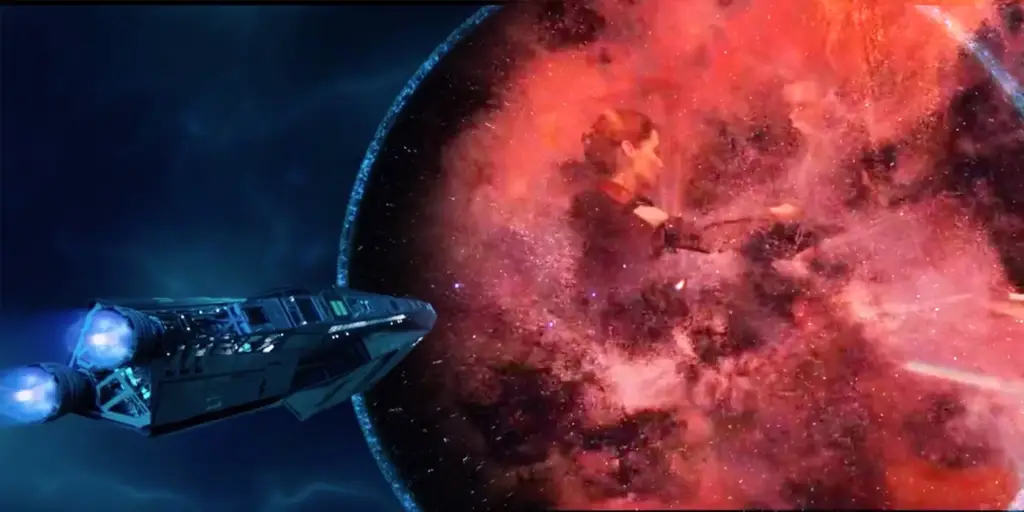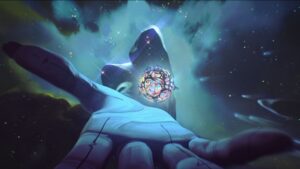Table of Contents
Introduction: Exploring the Depths of The Expanse
In the vast universe of The Expanse, we encounter not just a story of space exploration, but a profound exploration of the human psyche and societal structures. The series masterfully intertwines complex characters with rich psychological nuances, setting the stage for a compelling narrative that invites deep reflection. This Expanse Analysis aims to delve into the intricate layers of character motivations, moral dilemmas, and the philosophical inquiries raised throughout the series.
Each episode serves as a mirror, reflecting our own world’s challenges through the lens of a distant future. As we journey through various arcs and confront the characters’ struggles, we uncover insights about ourselves and the potential paths humanity may tread. The exploration of these themes invites viewers to ponder not just the fate of its characters, but also the larger implications for society as a whole.
Join us as we unravel the mind and meaning of this sci-fi masterpiece, revealing how The Expanse transcends traditional storytelling to become a rich tapestry of psychological and philosophical exploration.

The Psychological Landscape of The Expanse
Complex Characters and Their Motivations
The Expanse excels in its depiction of complex characters who grapple with their inner demons while navigating a multi-faceted universe. Each character embodies distinct psychological traits that reflect various aspects of human nature, revealing the vulnerabilities and strengths we all possess. From Jim Holden’s unwavering idealism to the pragmatic resilience of Naomi Nagata, the series showcases a rich tapestry of personalities driven by survival, loyalty, and moral dilemmas.
At the heart of the narrative is the exploration of trauma and its lasting effects. Characters such as Amos Burton and Dr. Julie Mao are shaped profoundly by their past experiences, illustrating how background and environment influence behavior. Amos, often perceived as a cold and ruthless enforcer, displays moments of unexpected empathy, hinting at the complexity of his character. This duality serves as a reminder of how trauma can create both monsters and heroes.
Interpersonal Relationships and Conflict
The psychological interplay between characters is another central theme in The Expanse. The series delves into the dynamics of trust, betrayal, and the struggle for power within relationships. Notably, the bond between Naomi and Holden challenges traditional gender roles in science fiction, as both characters support each other’s agency while navigating their connection.
Conflict is not just external; it runs deep within the individuals themselves. Take, for example, the character of Fred Johnson, who grapples with his past actions as a war criminal while striving for redemption. This internal conflict raises questions about guilt, forgiveness, and the possibility of change, provoking viewers to reflect on their perceptions of morality in a morally ambiguous world.

Themes of Identity and Belonging
The Expanse also tackles themes of identity and belonging, particularly through the lens of sociopolitical divisions between Earth, Mars, and the Belt. Characters like Dr. Chrisjen Avasarala provide insight into the complexity of duty and nationalism, highlighting the psychological toll of geopolitical conflict. The struggle for recognition and equality faced by the Belters serves as a poignant reminder of real-world socio-economic disparities.
Moreover, the series masterfully illustrates how one’s environment shapes identity and worldview. The disparate cultures and lifestyles of the Belt compared to Earth and Mars provide a rich backdrop for exploring how societal structures affect individual psychology. In this way, The Expanse invites us to question our definitions of community and belonging in an ever-expanding universe.

Philosophical Questions and Dilemmas in The Expanse
The Nature of Humanity
One of the most profound philosophical questions posed by The Expanse revolves around the nature of humanity itself. As characters face dilemmas that challenge their moral compasses, viewers are invited to consider what it truly means to be human. For instance, the show often juxtaposes the cold logic of AI and technology against the emotional complexities of human existence. With the emergence of the protomolecule, the series raises unsettling questions about identity and existence: What defines us when confronted with an unknown force that can manipulate biology itself?
The character of Holden often embodies the struggle between idealism and realism. His attempt to uphold humanity’s ethical standards when running into dilemmas highlights the conflict between moral absolutism and contextual ethics. Is it justifiable to sacrifice individual lives for the greater good? The choices Holden must make force viewers to grapple with similar questions in their own lives, reflecting the challenge of navigating a morally gray universe.
Power, Control, and Ethical Governance
Power dynamics are another focal point of philosophical inquiry in The Expanse. The series explores the consequences of authority through various factions, such as the UN and Mars, and their approaches to governance. The struggle for power leads to questions about ethical leadership and governance models. Characters like Avasarala and Johnson grapple with how to enact change without becoming what they oppose.
The implications of surveillance, manipulation, and control pose significant ethical dilemmas. The use of the protomolecule by various factions as a weapon raises questions about the morality of such technology and its impact on free will. Should humanity embrace technological advancements at the potential cost of ethical decay? This question resonates in today’s society, where advancements often outpace the development of ethical frameworks.

Free Will vs. Determinism
Throughout The Expanse, characters frequently encounter situations that question the concept of free will versus determinism. The influence of past decisions on current circumstances often suggests that individuals are trapped in cycles of violence and hostility. The narrative illustrates how personal history and societal pressures can shape character choices, prompting viewers to ponder the extent to which free will exists.
Moreover, the emergence of the protomolecule introduces another layer to this dialogue. Its seemingly autonomous nature raises questions about predestination and the extent to which outside forces can dictate human lives. Are characters simply pawns in a much larger game, or do they possess the agency to alter their fates? This dilemma encourages a deeper examination of individual responsibility amid chaos.

Ending Explained: Unpacking the Finale of The Expanse
The Resolution of Major Conflicts
The finale of The Expanse masterfully weaves together the disparate threads of its narrative, culminating in a resolution that both satisfies and provokes thought. As tensions between Earth, Mars, and the Belt reach a boiling point, the series confronts the repercussions of human ambition and the relentless pursuit of power. The climactic moments reveal that the true enemy may not merely be external factions, but rather the divisions and fears that reside within humanity itself.
The confrontation with the alien entity known as the “void” serves as a metaphor for the unknown challenges that humanity must face, challenging characters to reconcile their motivations with the broader implications of their actions. This moment encapsulates the essence of The Expanse, highlighting the need for unity in the face of existential threats. The shared realization among characters signals a turning point, as they recognize that survival depends not solely on their individual strengths, but on their ability to collaborate and unite.
Character Arcs and Symbolism
Each character’s journey culminates in the finale, reflecting profound themes of redemption, sacrifice, and transformation. For Holden, this conclusion represents the culmination of his struggles with authority, purpose, and moral integrity. His willingness to confront the unknown, even at great personal cost, underscores the growth he has experienced throughout the series. He becomes a symbol of hope, embodying the potential for positive change when individuals prioritize the greater good over personal ambitions.
Similarly, the character of Naomi Nagata undergoes significant development, maturing from a survivor seeking revenge to a key player advocating for diplomacy and understanding. Her evolution signifies the importance of community and interconnectedness, portraying the necessity for empathy in a fractured universe. These character arcs are laden with symbolism, revealing how personal journeys echo larger societal struggles.

The Philosophical Implications of the Ending
As the series concludes, it leaves audiences to ponder philosophical questions about humanity’s future. The final scenes suggest that while humanity may have faced overwhelming odds, its resilience and capacity for growth remain unbroken. The elements of sacrifice and collective responsibility emerge as vital themes, prompting viewers to reflect on their own roles in shaping the world around them.
The ending also reinforces the significance of understanding and coexistence. The challenges presented by the protomolecule and its legacy illustrate how humanity must evolve to confront not only external threats but also internal divisions. This message serves as a poignant reminder of the stakes involved in prioritizing dialogue over conflict, urging viewers to consider the path forward for humanity in the face of uncertainty.
Visual and Narrative Techniques in The Expanse
Stunning Visuals that Enhance Storytelling
The Expanse is distinguished not only by its compelling narrative but also by its groundbreaking visual techniques. The series employs a level of realism that immerses viewers in its expansive universe, a quality often enhanced by meticulous attention to detail in spacecraft design, planetary landscapes, and microgravity effects. Every visual element serves a purpose, heightening the emotional stakes of the characters’ journeys.
The use of lighting and color is particularly noteworthy. Warm tones are often applied to scenes involving Earth, evoking feelings of safety and familiarity, while the colder hues signify the vastness and hostility of space. This visual storytelling technique subtly underscores the emotional landscapes of the characters as they navigate their dilemmas.
Additionally, the series makes impressive use of practical effects alongside CGI. Relying on real models for spaceships and carefully choreographed sequences of zero-gravity action, The Expanse creates a visceral experience that enhances the viewers’ connection to the narrative. The transition from intimate character moments to large-scale space battles is seamless, allowing for a fluid narrative that maintains tension while exploring profound themes.

Narrative Structure and Character Development
Narratively, The Expanse employs a multi-threaded storytelling approach, intertwining various character arcs and perspectives to create a rich tapestry of experiences. This structure not only allows for in-depth character development but also mirrors the interconnectedness of the universe it depicts. Each character’s story serves a dual purpose, reflecting personal struggles while contributing to the overarching narrative that encompasses the fate of humanity.
The pacing of the series is another key technique. The slow unraveling of plot details engages viewers and encourages deep reflection. Tension builds gradually, allowing audience members to develop a sense of investment in the characters’ journeys. By giving each character sufficient screen time, the series cultivates empathy and understanding, prompting us to reflect on their choices within the complex moral landscapes they navigate.
Moreover, The Expanse effectively utilizes flashbacks and nonlinear storytelling to enhance character backstories. This technique allows viewers to understand the motivations behind character decisions, illuminating their psychological struggles while keeping audiences engaged with the present-day narrative. The interplay between past and present encourages an exploration of themes like trauma and redemption.
Recommended Books that Echo The Expanse’s Themes
One of the joys of engaging with science fiction is its ability to inspire readers to explore complex ideas about humanity, society, and the universe. Here are five book recommendations that resonate with the themes presented in The Expanse, each offering a unique perspective on the intricate interplay of psychology and philosophy.
The first recommendation is “The Dispossessed” by Ursula K. Le Guin. This novel delves into the contrasting societies of a capitalist world and its anarchist counterpart, exploring themes of freedom, identity, and the consequences of societal structures. Le Guin’s nuanced characters and philosophical explorations mirror the ethical dilemmas faced by the characters in The Expanse, particularly regarding collective versus individual concerns. Buy “The Dispossessed” here
Next, consider “Altered Carbon” by Richard K. Morgan. Set in a future where consciousness can be transferred between bodies, this novel grapples with concepts of identity, morality, and the implications of technology on the human experience. The psychological depth and moral ambiguity present in Morgan’s work reflect similar themes found in The Expanse, making it an engaging read for fans of the series. Buy “Altered Carbon” here
For those intrigued by the complexities of human evolution and societal change, “The Fifth Season” by N.K. Jemisin provides a gripping narrative about a fractured world coping with catastrophic environmental changes and societal divisions. Jemisin’s exploration of oppression, survival, and the interconnectedness of individuals mirrors the struggles faced by the characters in The Expanse. Buy “The Fifth Season” here
Another thought-provoking read is “Seveneves” by Neal Stephenson. This epic novel examines humanity’s efforts to survive after a catastrophic event threatens all life on Earth. Through its rich character development and exploration of societal dynamics, the book poses critical questions about resilience, adaptation, and what it means to be human, echoing the survival themes prevalent in The Expanse. Buy “Seveneves” here
Lastly, “Children of Time” by Adrian Tchaikovsky offers a profound look at evolution, artificial intelligence, and the future of humanity. The novel’s exploration of intelligence—both organic and synthetic—coupled with its ethical concerns about existence and purpose, resonates with the philosophical inquiries presented in The Expanse. Buy “Children of Time” here
These recommended books not only align with the themes of The Expanse, but they also invite readers to engage with complex ideas that challenge our understanding of humanity’s place in the universe.
Conclusion: Reflecting on The Expanse’s Impact and Lessons
In exploring The Expanse Analysis, we have delved into the psychological depths and philosophical inquiries that shape this remarkable series. The intricate character arcs, combined with the ethical dilemmas they face, reveal the complexities of human nature and our collective struggles in a rapidly evolving universe.
As we unpack the finale and reflect on the visual and narrative techniques employed, it becomes clear that The Expanse pushes the boundaries of traditional science fiction. It invites viewers to ponder crucial questions about identity, power, and the interconnectedness of humanity. The lessons learned from the series extend beyond its fictional universe, prompting us to consider how we navigate our own world and the moral choices we face.
Ultimately, The Expanse stands as a testament to the power of storytelling in addressing profound psychological and philosophical themes, leaving an indelible mark on its audience.
Take a look at all our in-depth reviews here.




